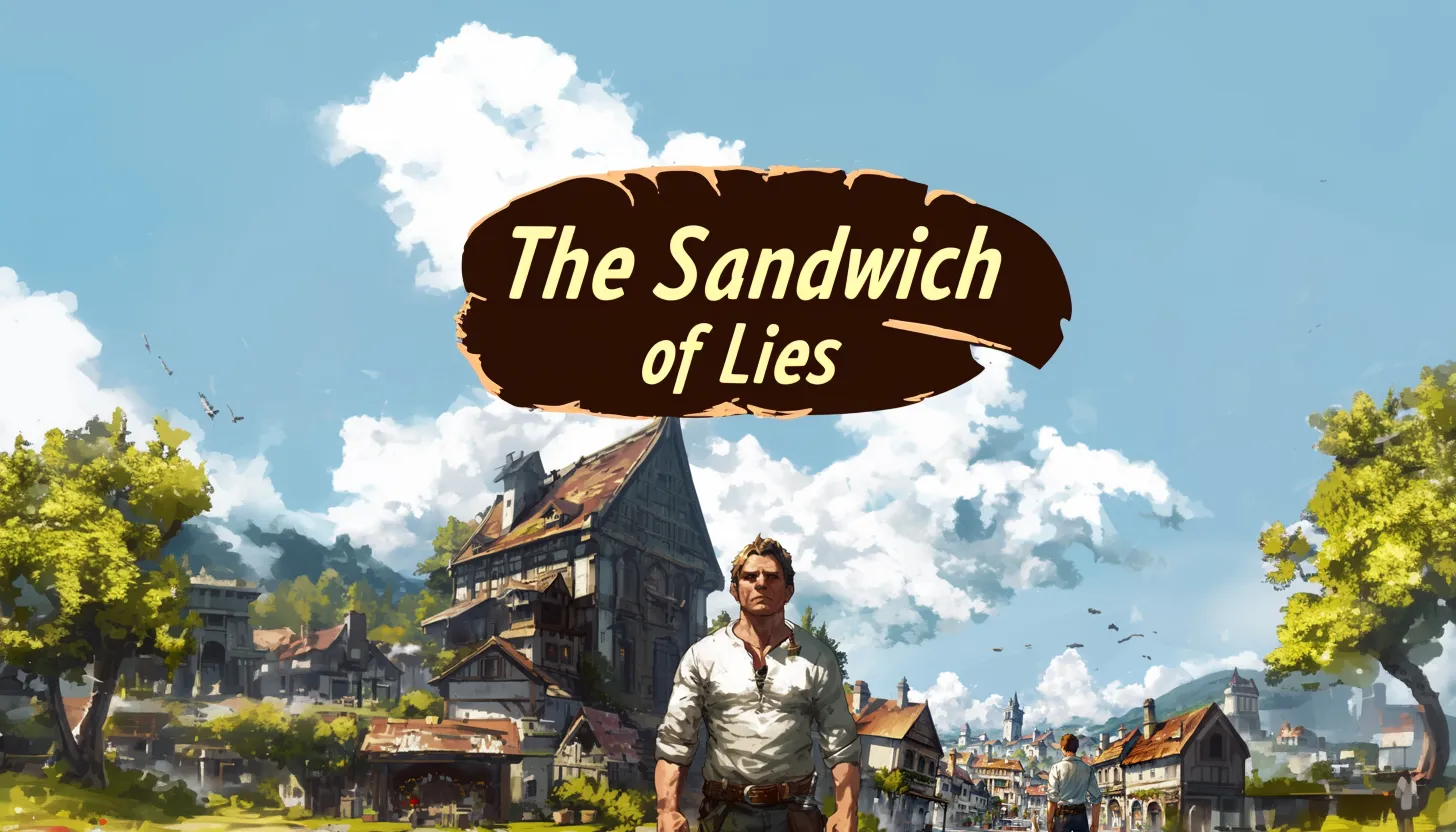Today, I want to tell you a story—a story about a perfect liar. How do I know he was perfect? Well, because nobody, absolutely nobody, ever knew he was lying. You might think someone must have suspected something—maybe a curious neighbor or a sharp-eyed friend. But no. No raised eyebrows, no suspicious looks. People believed every word he said, as surely as they believed the sun would rise the next day.
This is the tale of Sam Trueheart, a man so skilled at wrapping lies in truth that even Mrs. Beatrice, the town’s most seasoned gossip, never doubted him. His technique was flawless: he told lies in the shape of a “sandwich.” He’d start with a slice of truth, slip in the lie in the middle, and finish with another piece of truth, just like a good ham and cheese sandwich. No one—and I mean no one—could ever tell the difference.
It all began when Sam was just a boy and, without really meaning to, he learned how to lie about something very simple. You see, he had a little fish tank with three fish he took great care of, feeding them every day. One day, while he was watching his three fish, his cousin Billy asked him:
"Why do you always watch those fish, Sam?"
And Sam, without much thought, replied with complete calm:
“It’s because they say the fish understand me when I talk to them.” And it was true—he did talk to them every night, sharing little secrets, though of course, the fish never answered.
"And what do you talk to them about?" Billy asked, intrigued.
Then Sam smiled and, as if it was nothing, dropped the lie right in the middle of the sandwich:
“Well... sometimes I tell them I have a special fish that changes color if you come up quietly," he said, pausing dramatically, "but it only does it when no one’s looking straight at it.”
Billy’s eyes opened wide, fascinated by the idea of a fish that changed colors in secret. It was as if that fish held a hidden magic!
"Of course, you have to come very slowly, and if you blink, it goes back to its normal color,” Sam added, finishing his sandwich with another bit of truth, because, in fact, the fish did seem to change colors depending on the light from the window.
Billy didn’t doubt it for a second. From that day on, whenever he visited Sam, he would tiptoe to the fish tank, hoping that someday he’d catch that fish changing colors.
And Sam, seeing that his “sandwich” was a success, felt a small pride in his chest. The lie had been perfectly hidden between two truths, and neither Billy nor anyone else ever suspected a thing.
As time went on, Sam perfected his technique. He realized that the secret to lying was not to make the lies too big or too small, but to mix them well. Like a well-made sandwich, where it wasn’t just about the bread or just the filling, but the whole combination.
A good example of his skill happened one afternoon in the town square when Mrs. Beatrice cornered him.
“Sam, why didn’t you come to the town party last night?” she asked, hands on her hips.
Well, Sam hadn’t gone because he was busy with his new hobby: collecting unusual rocks in the forest, which he thought was far more interesting than any party.
“I couldn’t go because I had to help Mr. Rivers with his donkey,” he started, and it was true—he had helped Mr. Rivers get his donkey out of the gate that afternoon, though it was at four o'clock and the party started at eight.
“The poor thing was stuck between the gate and couldn’t even bray, it was so nervous,” he continued, adding just a touch of exaggeration to spice up the story.
“Oh! The poor donkey must have been terrified!” Mrs. Beatrice exclaimed, horrified and fascinated at the same time.
And so, with the truth about the donkey and a tiny bit of fiction, Sam had made a perfect sandwich. There was no doubt in Mrs. Beatrice’s mind or in anyone else’s who heard the story afterward. His lie had slipped in, hidden like a walnut in a cookie.
Now, one can get carried away with these “sandwiches,” and that’s exactly what happened to Sam one spring when he decided to tell his boldest tale yet.
It was harvest season, and everyone in town was busy picking apples and peaches. One morning, Sam showed up in the square, looking like he had a secret, and whispered to several neighbors that he had received an important job offer in the city.
“A job offer?” the mayor asked, raising an eyebrow. To be honest, no one in Half-Truth Town had ever heard of a city job for someone like Sam, who wasn’t a farmer, a craftsman, or a merchant.
“Yes, yes, from a very famous company,” Sam said, without naming any names, but with a serious tone, as if it were almost top secret. “They need someone who knows the forest paths well to organize routes and gather information about the animals that live in the area.”
Sam had spent one summer as an assistant forest ranger, so everyone assumed it must be true.
“It’s a great opportunity,” he added, with a hint of nostalgia, “but I won’t be able to come back to town for a while. I’ll have to live in the city, you know, and be available all the time.”
The townsfolk felt this sounded like progress, like Sam had become an important person overnight. Why doubt? No one imagined this was a “sandwich” of lies, with the truth of his summer ranger job wrapped in a healthy dose of imagination and a pinch of mystery.
The next day, Sam said goodbye to the town with an emotional speech. Everyone wished him well and waved their handkerchiefs as he began his “journey” to the big city. They even threw a party in his honor, remembering all the wonderful things Sam had told them, all his unforgettable stories, and his gift for making people laugh.
However, on the road to the city, Sam met his fate on a lonely bend. According to travelers who passed by days later, that stretch was tricky, and many carts had accidents there. But Sam was alone, and no one stopped to help him.
The town, for its part, never suspected a thing. They assumed that Sam was very busy with his new job, just as he had explained. Weeks went by, then months, and there was never a letter or a sign from him. Since no one expected him to return, no one went looking for him. His lie was so perfect that it even covered up his own disappearance.
In the end, people decided that Sam had stayed there, in the city, thriving in his mysterious job as an explorer and trail guide. His lie became his own hiding place, his last great creation.
And so, dear listeners, this is the end of our story, the tale of a perfect liar—a liar so skilled that even when he vanished, no one doubted his word. Because, you see, if a lie is told well enough, it might just be the last thing that’s remembered about you.




